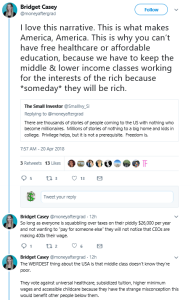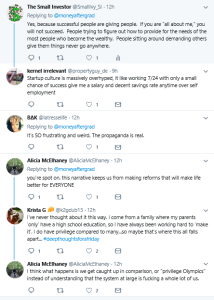They say that if you don’t learn from history, you’re doomed to repeat it. We’re seeing a dark history start to repeat in its newest form, the Privilege Argument. The cycle goes something like this:
- People are unhappy because they don’t feel they make enough money.
- People wanting to gain power tell them that the reason they don’t have enough money is that some other group of people are wealthy and keeping them down.
- Other people, who think that the people want to gain power are super cool and really smart with all of the answers, repeat their rhetoric. The term, “useful idiots,” was coined for this group of people since they have been fooled by the people who want to gain power and are therefore useful for obtaining their aims.
- The people who think they don’t have enough money rise up against the group of people who have been demonized, either physically through riots or by electing the ones who want to get power because of their promises to take the money from the demonized group and give it to the mad group.
- The demonized people are imprisoned, banished, or killed in gruesome ways and their property stolen. Much of their wealth is destroyed very quickly, making everyone poorer.
- The people who wanted power become dictators, oppress the people, and lots of people are shot or starve.
Examples of this pattern are:
The Bolshevics, Russia, early 20th century:
The Marxists, under Lenin, convince the Russian people that the Czars and Russian Elite are the cause of their problems. They rise up against the leaders with violence and put the Bolsheviks in power. Lenin isn’t too bad to start, but eventually Stalin rises to power and kills millions of people. The Russian people live a sad life with long lines for necessities and scarcities of things like toilet paper. Eventually, the USSR falls, but the corruption left from the remains of the old Soviet party remain today.
The Nazis, Germany, mid-20th century:
The German people are unhappy after the loss of WW1 and the severe restrictions placed upon them by the nations who conquered them. Inflation is rampant with wheelbarrows full of cash being needed to buy groceries. The Nazis, under Adolf Hitler, convince the people that the Jewish people, who run many of the shops and banks, are the cause of their plight. (Note, the Nazis were Socialists, not right-wingers.) The people put Hitler in charge, who proceeds to try to take over the world. Millions of Jews, Poles, homosexuals, and Gypsies are put to death in concentration camps. Millions of people are killed in WW2. Today some neo-nazi groups remain, still spreading a rhetoric of hate.
Hugo Chavez, Venezuela, Early 21st century:
Hugo Chavez convinces the population of Venezuela that the wealthy white farmers and foreign oil companies are the cause of their problems. The people rise up and put Hugo Chavez in power. The farmers are chased off of their land and the farms are given to squatters who have no idea of how to run a farm or have any desire to do so. The foreign oil companies are chased away and the wells taken over by a corrupt government-owned oil company. Today the country is starving to death and those who oppose the dictator in charge have their meager food rations withheld. One of the effects of centralizing distribution of necessities is that those who oppose the leaders can have necessities withheld. No need to send in troops with guns to control the population.
Hey – if you like The Small Investor, help keep it going. Buy a copy of the SmallIvy Book of Investing: Book1: Investing to Grow Wealthy or just click on one of the product links below, then browse and buy something you need from Amazon’s huge collection. The Small Investor will make a small commission each time you buy a product through one of our links.
Shop Appliances
Find a great new book
Shop DVDs
Buy your Pet Supplies
Tools and Hardware
Best Selling Toys and Games
Patio Lawn and Garden Supplies
Clothing and Accessories
Baby Products
Health and Personal Care
The sad thing is that despite these examples (and there are a lot of other examples), the cycle keeps repeating. This is because this philosophy, take money from the wealthy (who must have become wealthy by oppressing others) and give it out to people who are in need because they are being oppressed, sounds good to people. Often a government is put in between since that insolates the people who are taking the money from the ones that they are robbing:
We need the poor to have food. Lets have the government provide food.
The government is seen as a limitless source of funds that can be used for whatever social good is needed. This is separated from the other side of the coin, which is required for the “government” to provide the food since the government itself produces nothing:
The government is running out of money. We need to raise taxes so that the government doesn’t run out of money. Wealthy people can afford to pay more since they don’t need all of that money. In fact, the wealthier you are, the greater the percentage of your wealth you should pay since you have obviously done evil to become that wealthy.
Even if the taxes become burdensome to the point where less food (and everything else) is being produced since those who are most productive decide to leave the society or simply do less. If you try to cut programs back, you get the argument:
How dare you not support programs that are providing. You’re taking food away from poor people.
For some reason, this idea tends to be promoted not by the poor but by individuals who have been successful. Perhaps this is out of a sense of guilt because they have succeeded while others have not. They do not feel guilty enough to take on the whole problem by themselves, however, giving away a good share of their wealth. Instead, they demand that others give away their wealth and use the force of government to cause this.
There also seems to be a feeling of superiority by this group of do-gooders over the people they want to help. It is true that many of the do-gooders are highly educated and very intelligent, but they lock themselves into an echo chamber and never allow their idea that “government” can just do it all to be questioned. (Many of the useful idiots tend to be highly educated and taught by professors who are leftists to the point of being Communists, who themselves have been isolated from the need to work in a real economy where costs must be balanced by revenues and where raising prices reduces the amount of revenue collected. Because they have tenure, they are isolated from economics, so they are free to advocate for their theories without any real effects coming to them.) The do-gooders, because they believe they are superior to those they wish to help, believe that others cannot make a better life for themselves through the path that they themselves have taken – education, learning of skills, hard work, seeing to the needs of others – because others are inferior and not capable of taking their path. Racism also often enters in here, with the do-gooders telling themselves that those of other races can’t make it due to racism by others (even though the do-gooders control most of the necessities for success like at least half of corporate board seats and all of university admissions), but deep-down feeling that those of other races cannot make it due to a defect in their race.
Today the argument has resurrected itself in the idea of privilege. The idea is that certain individuals have privilege, and therefore are able to be successful. Those who are not privileged cannot improve their lot. If someone does not have privilege but succeeds anyway, it is chalked up to blind luck that could not be replicated. White males, in particular, have been singled out as privileged, although virtually anyone whose family has saved and worked to earn money to provide things like a college education or a stable home-life is seen as privileged. Nevermind that the reason they are “privileged” is usually that their parents sacrificed and worked hard, spending a great deal of time providing things of need to others, to put them in that position. Those who are seen as privileged are the ones being demonized in this journey through the old cycle of demonize, take, then oppress. This is the way in which those who want to gain power this time are trying to convince the poor and middle class to put them into power:
People who are privileged have an unfair advantage and there is no way someone who is not privileged can succeed. Put me in office and I’ll tax and punish the privileged to level the playing field. If you have succeeded, you must have been successful or lucky, so you should feel guilty and support the righting og this great wrong.
To see an example of this philosophy, read The Funnel of Privilege by Bridget Casey. Note that she talks first about how some are privileged and her envy (envy is a powerful tool used by those seeking power), then describes how she was able to make it and get a degree despite not being privileged. One would think that this would negate her whole argument and she would be advocating for free markets and encouraging others to follow her path. Instead, she inexplicably concludes that others who are not privileged probably won’t be able to make it without special assistance. For some reason she thinks that the path she chose is closed to others, either because things have changed or because she was somehow special – maybe she had the privilege of intelligence or just good fortune or something. Note the arguments that emerge when I challenge her on this on Twitter, suggesting that others could improve their lives and move into the middle class and even the leagues of the wealthy by spending time trying to serve the needs of others through education and work:

Notice that she first demonizes me, saying that my secret goal is to keep those in the middle class and those who are poor working as slaves for the wealthy. (Somehow I’m part of this secret society trying to keep the poor down because I’m not for large, incentive robbing government program that encourages people not to produce and thereby make society as a whole poorer.) Again, the wealthy are seen s oppressors of the poor, only becoming wealthy because they took advantage of the poor. My personal observations are that those who become wealthy tend to be very giving people who spend a great deal of effort creating businesses and things that greatly improve our lives. They also make great sacrifices in order to build their businesses and provide for others. I don’t know of anyone who became wealthy through a business who didn’t spend 12-hour days in the office at least. (If you want to learn how to become wealthy without starting a business, but through investing, pick up a copy of The SmallIvy Book of Investing where I lay out the game plan needed that anyone with a middle-class income can follow.)
She also can’t understand why those in the middle-class would be against things like universal healthcare. The reason if you use a little bit of logic is simple: It is because those who aren’t wealthy can’t afford to pay for other healthcare if the public healthcare is of poor quality, so they lose their ability to choose their healthcare if they are taxed to pay for a public system. Those who are wealthy can just buy better healthcare, education, etc. if they don’t like the public system. They are free to travel the world if needed to get better things. Those in the middle-class and the poor are not.
Certainly, those whose parents worked hard and put money away so that their children could go to college debt-free start out their adult lives on a better footing than those who didn’t and therefore start with a large student loan. Certainly, those who grew up in a home where their parents made sure they did their homework and helped teach the lessons they didn’t understand from the classroom had an advantage to those who came home to an empty house. Certainly, those who grew up in a mansion and were given a car when they turned 16 had an advantage.
But the things that will make those who were disadvantaged successful is the same things that will make those who are advantaged successful: Gaining skills, working hard, choosing a good career path, meeting the needs of others, spending less money than they make so that they can put money away and invest. To do otherwise would make those who are advantaged fail just as it will make those who are disadvantaged fail.

Want all the details on using Investing to grow financially Independent? Try The SmallIvy Book of Investing.
The post also draws comments from others who question their own success, thinking that maybe it is only because they are privileged. (See Krista G’s comment below, where despite her coming from a modest background and working hard for her success, believes now that she somehow must have been privileged or she would not have been successful.) Note also that they attack my narrative, that people who work to improve themselves and commit themselves to doing useful things for others can better their position in life. My narrative is seen as keeping us from “making reforms that will make life better for EVERYONE,” where “making reforms” mean they wish to give the government more control and allow them to take money from the wealthy to fund public programs and my ideas are standing in their way. Again, the demonization of those who object to their plan. This is the useful idiots pushing the agenda of those who want to seize power by centralizing authority:

Hopefully, people won’t be fooled again this time. People who are free are able to improve their lives. There are thousands of people who are first-generation wealthy in free countries like the US. There are millions of others who have entered the middle class despite a meager start. The secret is spending time providing for the needs of others, spending less than you make, and investing to increase the rate of your wealth growth. The way to do this last item is covered in The SmallIvy Book of Investing for those interested. The way to stay where you are is to become obsessed over things like privilege to the point where you give up and don’t try to succeed. People who are successful will tell you, the harder you work the luckier you become.
Have a burning investing question you’d like answered? Please send to [email protected] or leave in a comment.
Follow on Twitter to get news about new articles. @SmallIvy_SI
Disclaimer: This blog is not meant to give financial planning or tax advice. It gives general information on investment strategy, picking stocks, and generally managing money to build wealth. It is not a solicitation to buy or sell stocks or any security. Financial planning advice should be sought from a certified financial planner, which the author is not. Tax advice should be sought from a CPA. All investments involve risk and the reader as urged to consider risks carefully and seek the advice of experts if needed before investing.
